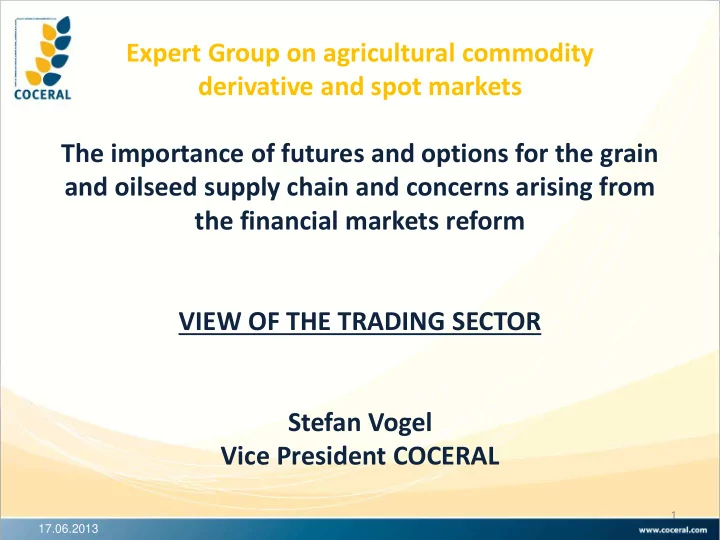

Expert Group on agricultural commodity derivative and spot markets The importance of futures and options for the grain and oilseed supply chain and concerns arising from the financial markets reform VIEW OF THE TRADING SECTOR Stefan Vogel Vice President COCERAL 1 17.06.2013
COCERAL is the EU association representing trade in cereals, oilseeds, feedstuffs, olive oil and agrosupply 31 Member Associations 19 EU countries 1 Associated in Switzerland 2700 companies
Quality of Data: USDA-Estimate of World Grain S+D for 2007/08 Production estimate mln t bln t Consumption estimate Difference = Prod. – Consumption in mln t Grain production revised up by +45 mln t in 4 weeks Source: USDA 17.06.2013 3
Quality of Data: USDA-Estimate of World Grain S+D for 2007/08 and wheat price mln t Difference = Prod. – Consumption in mln t Source: USDA, CME 17.06.2013 4
Good Information is key! • Today USDA is the most important source for market participants – But cost cutting and reduced services • AMIS is important and welcome, however: – Only 4 commodities – Information from some key regions (e.g. Russia or China) need improvement 17.06.2013 5
MAR for agricultural commodities • Art. 7 and 9: Prohibition of insider dealing as designed today could prevent hedging of risks for ag. commodities contracts if traders cannot hedge using commercial information • Need for a workable exemption of hedging strategies for ag. commodities operators • As per MAR inside information means “ information of a precise nature, which has not been made public, relating, directly or indirectly, to one or more issuers of financial instruments or to one or more financial instruments, and which if it were made public, would be likely to have a significant effect on the prices of those financial instruments or on the price of related derivative financial instruments 17.06.2013 6
Inside Information – Many trading companies have a physical presence in many locations around the world and gather local and regional information about weather, crop conditions and demand factors. THIS NEEDS NOT TO BE CONSIDERED INSIDE INFORMATION! – This information is necessary to take informed decision and to protect operators against price risk stemming from their physical trading activities. – The collection and use of proprietary information is not illegal, unless it is obtained illegally. – CFTC: RULE 180.1 (Eddie Murhpy Law) • sensitive non-public information obtained from government agency or a private futures industry self-regulatory organization • sensitive non-public information obtained by fraud or deceit or in breach of a pre-existing duty 17.06.2013 7
MiFID II for agricultural commodities [ on-going decision making ] • Exemption – art.2: Commercial (agricultural) firms which hedge their risks exempted from MiFID II for their main and ancillary business. • Definition of ancillary is key as 1 physical sale incorporates much more than just shipping grain from A to B: – Forward sale of 60,000 t of wheat to a customer in N. Africa for delivery in 4 months • Hedge of 60,000 t of wheat at e.g. Matif exchange • Hedge of exchange rate risk related to the trade • Hedge of freight (e.g. FFA via Baltex) and bunker fuel – Physical purchase of wheat & either another hedge at an exchange or the lift of wheat sale hedge – Contracting of vessel and fuel & lift of hedge – Physical delivery of grain to customer in N. Africa 17.06.2013 8
MiFID II for agricultural commodities [ on-going decision making ] • Position management – art.59: ag. commodity contracts will be subject to “position checks” instead of limits • Position management allow managing positions in a more flexible way rather than strict limits • Position limits are not adapted to the changing nature of the real market and prevent participants from hedging full price risk exposures on the derivatives markets 17.06.2013 9
MiFID II for agricultural commodities [ on-going decision making ] • Position reporting – art.60: position reporting done by financial counterparties, i.e. CCP (Central Clearing Party) or broker. • Creation of weekly publication with aggregated positions by category of trader • Relatively similar to CFTC report 17.06.2013 10
17.06.2013 11
EMIR and agricultural commodities • Clearing threshold for non-financial entities of > 3 bln EUR OTC volumes • For uncleared trades: Post-trade reporting, record-keeping, collateralization and margin • Clearing obligation for non-financial entities will enter into force not before 2017 - important to allow to build the needed clearing possiblities 17.06.2013 12
3 bln EUR clearing threshold sounds much , but… Buys grain from farmers Afiliate A (own legal entity in Asks Central Hedge Desk to hedge risk = OTC which is part of EMIR country A) Sells futures as hedge Lift of the hedges Central Hedge Desk Buys futures or gets out of Transfer of grain (legal entity in country B) previous hedge Asks Central Hedge Desk to hedge risk = OTC which is part of EMIR Afiliate C (own legal entity in Sells grain forward to consumer country C) • 1 physical sale of grain from country A to customer in country C might trigger 2 or more Intra- group OTC‘S • Intra-group exemptions are available, but are they enough to cover such practices? • Turnover of large companies: 50-100 bln EUR (15-34x clearing threshold) 17.06.2013 13
Where are physical agricultural commodity traders active? Hedging mainly on following market venues: – EURONEXT (NYSE/ MATIF/LIFFE) – e.g. wheat, rapeseed, cocoa – CME (Chicago) – e.g. wheat, soybeans, corn – ASX – mainly wheat – JADE – palm oil – KCBOT, MGEX, ICE Futures Canada etc – OTC markets 17.06.2013 14
Trade is global - trading companies are global - compliance with global rules MiFID/EMIR/MAR DODD-FRANK Asian Rules Alignment and harmonization of international rules needed, e.g. reporting Derivative transactions are not geographically limited, both EU and international legislation should be consistent and coherent with each other as otherwise geographical shopping is encouraged 17.06.2013 15
THANK YOU secretariat@coceral.com 17.06.2013 16
Recommend
More recommend